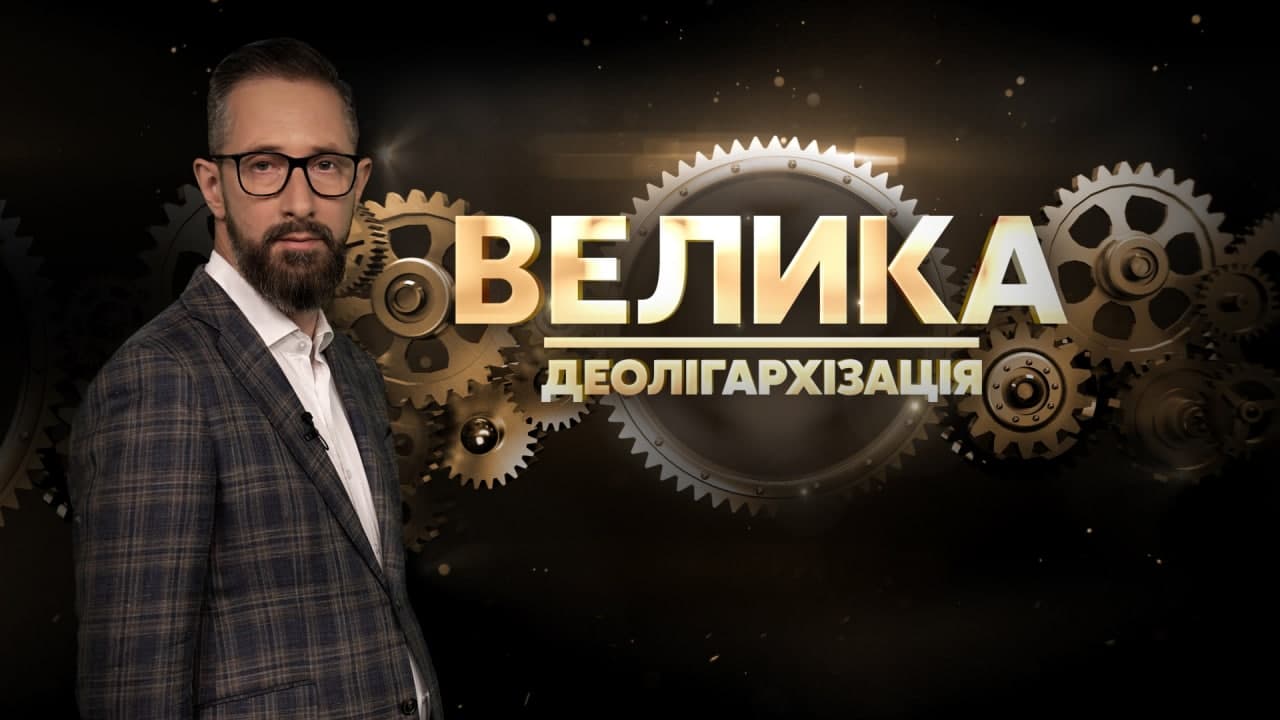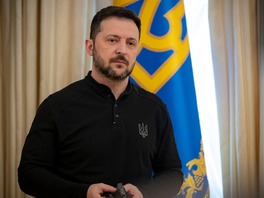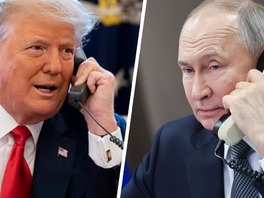Dmytro BELIANSKY, the author and host of this television project, member of the Supervisory Board of Media Group Ukraine, spoke about how the Large-scale De-oligarchization show was created, the goals its creators set for themselves and the secrets of its popularity in the interview for Apostrof.
— Dmitri, your show, Large-scale De-oligarchization, has been on the air of the Ukraine 24 TV channel for more than a month. Did you manage to implement everything that was planned at the start?
— Starting from 3 July, the Large-scale De-oligarchization weekly show has been airing on two channels of the Media Group Ukraine — on Saturdays at 10.00 p.m. on the leading information channel Ukraine 24 and on Mondays at 00.10 a.m. on the all-national leading channel Ukraine. The difference between these two displays is still technical in nature, but, in general, we are already ready to do two different shows a week — there is enough content.
We will be able to say whether we managed to bring our plans to life after the completion of the television project. Its fate is directly related to the development of an actual social and political process known as “de-oligarchization”.
— The essence of the project is to follow the main reform of the President of Ukraine and explain to the audience exactly how de-oligarchization is going on, is it not?
— Rather, follow and loudly ask questions, including those that come to mind of the most diverse viewers, than explain anything. Those who started de-oligarchization and have already declared it a panacea for all the troubles of Ukrainian society should explain their position.
Moreover, they may well explain their points of view through us. As a media, as a responsible intermediary, we provide them with a time-proven, qualified service — give us facts and information, and we will find words to explain to the public what you mean.
— What is the main value of the Large-scale De-oligarchization show?
— For me, this is one of the most challenging experimental journalism projects I have ever taken part in. In addition to a group of purely television and format techniques that we have long wanted to perfect on the air, we are also talking here about very complex things and trying to organize a conceptual discussion where smooth slogans and loud shouts are usually heard.
Large-scale De-oligarchization is definitely not a grand approval. At the same time, indeed, the discussion is being conducted from an open and pre-stated position that President Zelenskyy should not lose his rating in his fight against the System, Ukraine should not lose large and transparent businesses, and large and transparent businesses should not lose their reputation.
— Tell us about the project team. How many people are behind the creation of information and analytical weekly show?
— While a month ago we launched the Large-scale De-oligarchization as an information and analytical weekly show, that is, the classical final show dedicated to one topic, today, due to assessment of the effect of experiments, the format legend has already been changed. I suggest perceiving Large-scale De-oligarchization as a political series, the first season of which began with the adoption in the first reading of draft law 5599 and will end with a vote for this draft in the second reading.
Speaking about the number of people involved in the production, I would like to point out that this is just a “home” project for our news — the whole team will join it as needed. The editorial part is conducted by Vitalii Tarasov, the director part is led by Boris Dolina, and the main political correspondent of the project is Eduard Ganishevsky. From the market, we attracted our former, but no less beloved colleague, Alexander Bondarenko to make a story about “The President’s Diary”, but this is not his main job.
As well as for Iuliia Mendel, our excellent columnist.
— How long does it take you to prepare each topic in the show?
— I define my role in the production of this project as a watchdog. Accordingly, I am focused on this 24/7. Observing the de-oligarchization process and looking for forms that we can use to communicate our observations to society.
— It is no secret that toxic comments cannot be avoided on social media. Have you encountered any negative when launching the show? How do you deal with online criticism?
— As you know, knowledge increases sorrow, but in this case the opposite is true — if you know where the criticism comes from on the Internet, you do not react to it in any way, but rather mechanically estimate the budget allocated to send best regards.
However, there is an exception. We managed to arrange the premiere on 3 July at 10.00 p.m. on the day of the match between Ukraine and England, and when some frustrated Ukraine 24 online broadcast viewers commented on YouTube “Where can we watch the game? Why is there no game? Who is this four eyes?”, there was no doubt about the sincerity of their feelings.
— Recently, Iuliia Mendel has joined the show as a columnist. How did you manage to involve the former press secretary of the President of Ukraine in the show on de-oligarchization?
— I have been working in the assets united in the Media Group Ukraine for ten years and, to be honest, during this time we have never had any difficulties in attracting anyone to our team.
Actually, it’s not a secret for anyone that both MGU and other SCM assets have been brought in line with the business philosophy of the shareholder, Rinat Akhmetov, which implies the creation of the best working conditions on the market. This is not about any excess wages, the wages are strictly the market ones, we are talking about a whole complex of what is commonly known as “working conditions”. Since we always offer the best terms, we have no problem attracting the best people. Just the opposite happens.
Therefore, our partnership with Iuliia Mendel is not based on any incredible financial conditions, it is based precisely on the creative partnership — it is beneficial for both her and us. I believe that Iuliia Mendel is like Greta Thunberg for Ukrainian politics today. She is criticized a lot, but her words deserve attention. And she herself deserves support, too much controlled and uncontrolled hatred has lately descended upon our colleague.
Therefore, we could not help but offer her a job. Moreover, reaching out to the weak is another philosophical principle of MGU’s shareholder. So this cooperation is fully in line with our policy.
— Do you plan to invite celebrity guests representing Ukrainian politics?
— I would like to invite Yanina Sokolova to become a columnist for the Large-scale De-oligarchization, but I hesitate, due to dramatic circumstances of our parting with her in April 2020 by my decision.
— The audience likes the Large-scale De-oligarchization program not only for the useful information but also for its special style. How important is it to develop your own author’s approach?
— Judging by the ratings, the audience is really very kind to the Large-scale De-oligarchization, but it is too early to analyse anything seriously after the broadcast of six episodes. In any case, put it another way, we use a format for experiments and the development of a number of innovative ideas, so it is definitely interesting for professionals to watch. As well as the political class, since they unaccountably perform the role of experimental subjects in this case.
— You wrote on your Twitter that “De-oligarchization is too serious of a matter to be entrusted with the officials”. Why is that?)
— There is such a concept as “Easter eggs” in the vocabulary of gamers and programmers. Stanley Kubrick’s Dr. Strangelove or: How I Learned to Stop Worrying and Love the Bomb is one such Easter eggs explaining the show.
Actually, there are no superfluous elements in any episode. Everything plays a role here. Including music, promo and every word of studio text.
— In addition to the TV show, Large-scale De-oligarchization has its own Telegram channel. Could these social media posts, for example, turn into a documentary in the future?
— For now, the Telegram channel of the same name is used exclusively for auxiliary purposes and is aimed at those who will never turn on the TV again in their lives — we cannot deprive them of such pleasure.
It is hard for me to say yet what the Large-scale De-oligarchization will grow into, it directly depends on how... the lesser-scale one will end? Well, I mean the regular de-oligarchization. For example, Iuliia Mendel argued in her latest show that the creation of the Large-scale De-oligarchization party, in general, would have given no worse electoral results than the creation of the Servant of the People party.
— We can learn about problems in politics from your show, and what, in your opinion, is one of the main problems of society that should be solved?
— Our problem is poverty. And the fact that the only working social elevator is called “the System” when those who have been elected to a public office start getting rich at the expense of the poor.
Therefore, the fact that President Zelenskyy went against the System means much more to me than the fact that he calls this de-oligarchization.
The path from poverty to wealth should be reduced to a simple choice of two lifts — either good education and a career in a large corporation or your own business. But first, the System must be destroyed.
— There is a lot of competition on television. How to win this fight and keep the viewer?
— It is known that the stronger the competition, the more benefits to the viewer — audiences are offered more and more high-quality products. If there was no such strong competition on Ukrainian television, if it fully corresponded to the capabilities of our advertising market, then, I’m afraid, we would already be sadly watching the total sunset of TV. And in this case... We keep the viewer by competing with each other!
— Share your personal experience: what is important in modern television?
— Constantly looking for the answer to why the viewer should watch it, and not read, hear or just know anything about it.
— Ukraine 24 holds the leading position in the information channels niche of the media market. How does the channel do it?
— Well, this is how we planned this channel, so reaching the first position in the information channels niche is a major achievement, because it is very quick and cost-effective, but still a technical achievement. The task of taking the next step, i.e., for example, doubling the achieved indicator, is not so trivial. But we all hope that Serhii Lohunov and his team, who joined the News Group Ukraine in spring, will confidently take this step.
— You also have tremendous experience of working on television, namely, on-screen and off-screen. What is the fundamental difference?
— Honestly, my on-screen experience before the launch of the Ukraine 24 channel was in the early 2000s, so in a sense, as a host, I am still a debutant and an amateur. Thanks to the off-screen experience, it does not stress me out, but objectively that is true.
— How do you see your mission as a host?
— In daily work with information sources that imminently trust me. This is very specific information, given what the Large-scale De-oligarchization show is about, and I am afraid that the choice was simple — to understand the essence and not listen to slogans, now you have to go into the profession yourself and act according to journalistic standards. Protecting our sources, but getting real information from them.
— What is your goal for this year?
— To arrange a couple of more worthy reasons to speculate about this in an interview with you. Thank you for this great opportunity to talk frankly about my work.





